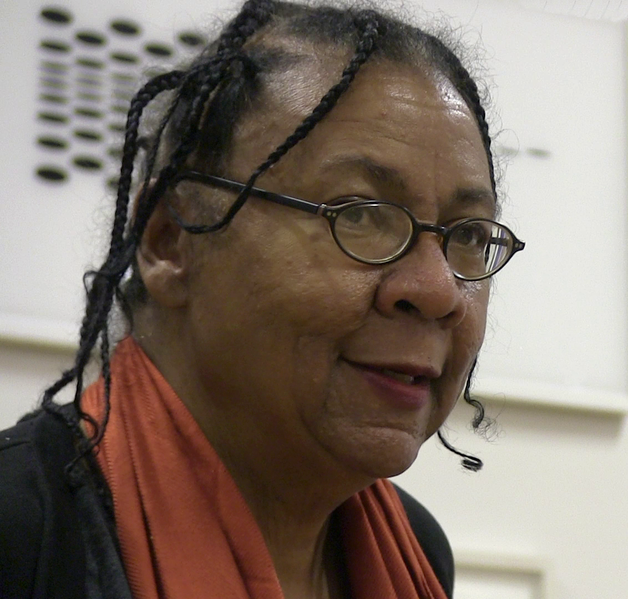On December 15, 2021, esteemed Black queer feminist author bell hooks (Gloria Jean Watkins) passed away at her home in Berea, Ky. She was 69. Her sister Gwenda Motley said the cause was end-stage renal failure.
The American activist and author was a Distinguished Professor in Residence at Berea College. Her work focused on the connections of race, gender and economics and their ability to create and sustain oppressive systems. She explored the varied perceptions of Black women and feminist identity.
At the age of 19, hooks began writing her first full-length book, Ain’t I a Woman: Black Women and Feminism, published ten years later in 1981. She studied English literature at Stanford University (B.A., 1973), the University of Wisconsin (M.A., 1976), and the University of California, Santa Cruz (Ph.D., 1983). hooks went on to teach at the University of Southern California, Yale University, Oberlin Collect and City College of New York.
Her incisive and wide-ranging writings included feminist theory, poetry and children’s books. hooks called for a new feminist framework that recognized differences and inequalities among women, toward a more inclusive movement. Her groundbreaking work on anti-Black racism was a focus of many of her books, as was literary criticism, education and American history.
By the 2010s she had entered semiretirement and was spending her days writing, meditating and visiting with her neighbors. Her focus shifted to the end goals of feminism and antiracism as that of importance of community and of healing. She declared herself a Buddhist Christian and said love was the only way to overcome the “imperialist white supremacy capitalist patriarchy.”
In 2015, bell hooks was interviewed by George Yancy for the New York Times. During that interview, she said, “I am a total intellectual. I tell people that intellectual work is the laboratory that I go into every day. Without all of those people engaged in civil rights struggles, I would not be here in this laboratory. I mean, how many black women have had the good fortune to write more than 30 books? When I wake up at 4 or 5 in the morning, I do my prayers and meditations, and then I have what I call my “study hours.” I try to read a book a day, a nonfiction book, and then I get to read total trash for the rest of the day. That’s luxury, that’s privilege of a high order – the privilege to think critically, and then the privilege to be able to act on what you know.”
Bibliography
| Ain’t I a Woman: Black Women and Feminism |
| All About Love: New Visions |
| Appalachian Elegy: Poetry and Place |
| Art on My Mind: Visual Politics |
| Be Boy Buzz |
| Be Love, Baby Love |
| Belonging: A Culture of Place |
| Black Looks: Race and Representation |
| Bone Black: Memories of Girlhood |
| Breaking Bread: Insurgent Black Intellectual Life |
| Communion: The Female Search for Love |
| Eating the Other: Desire and Resistance |
| Feminism Is for Everybody: Passionate Politics |
| Feminist Theory: From Margin to Center |
| Grump Groan Growl |
| Gumbo Yaya: Anthology of Contemporary African-American Women Artists |
| Happy to Be Nappy |
| Homegrown: Engaged Cultural Criticism |
| Homemade Love |
| Killing Rage: Ending Racism |
| Otras Inapropiables: Feminismos Desde Las Fronteras |
| Outlaw Culture: Resisting Representations |
| Reel to Real: Race, Sex, and Class at the Movies |
| remembered rapture: the writer at work |
| Rock My Soul: Black People and Self-Esteem |
| Roni Horn: Earth Grows Thick |
| Salvation: Black People and Love |
| Seduction and Surrender |
| Sisters of the Yam: Black Women and Self-Recovery |
| Skin Again |
| Soul Sister: Women, Friendship, And Fulfillment |
| Talking Back: Thinking Feminist, Thinking Black |
| Teaching Community: A Pedagogy of Hope |
| Teaching Critical Thinking: Practical Wisdom |
| Teaching to Transgress: Education as the Practice of Freedom |
| The Fabric Workshop/Museum, Philadelphia / Organise Par The Fabric Workshop/Museum |
| The Will to Change: Men, Masculinity, and Love |
| We Real Cool: Black Men and Masculinity |
| Where We Stand: Class Matters: Class Matters |
| Woman’s Mourning Song |
| Wounds of Passion: A Writing Life |
| Writing Beyond Race: Living Theory and Practice |
| Yearning: Race, Gender, and Cultural Politics |
Photo Alex Lozupone (Tduk), CC BY-SA 4.0 <https://creativecommons.org/licenses/by-sa/4.0>, via Wikimedia Commons
